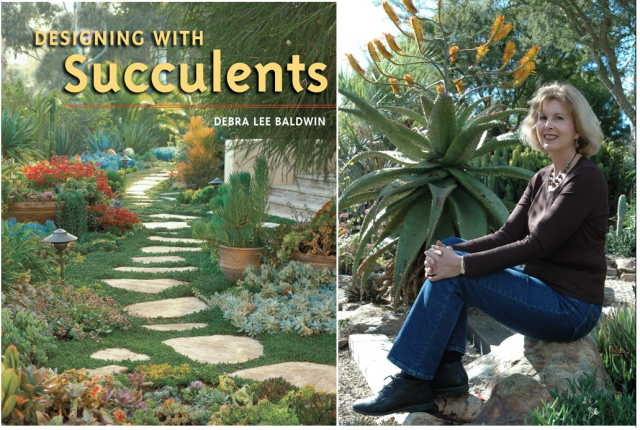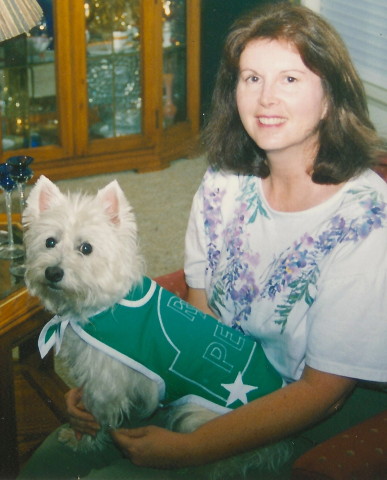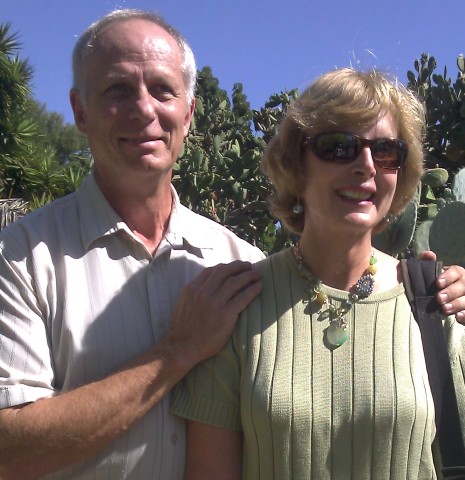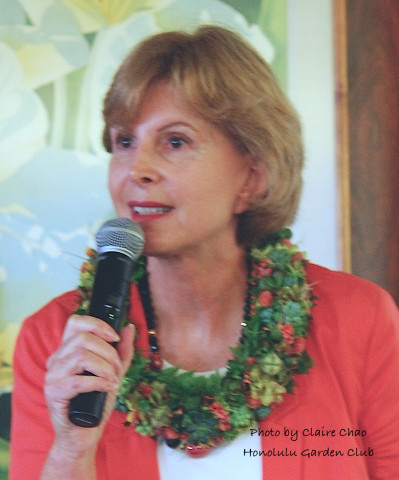
When Designing with Succulents became a bestseller in 2007, few people knew what was really going on with me. I’m sharing it now because it might encourage others to persevere through difficult times. A bit of backstory:
For half my life, I didn’t live up to my potential due to fear of failure. A highly accomplished writer whom I liked, admired and envied told me she reinvented herself about once a decade. I assumed at the time that the courage to embrace new experiences was something she was capable of and I wasn’t. Not true! Yet I spent decades snoozing beneath the comforting-yet-troubling assumption that if an opportunity terrified me, it wasn’t meant to be. To sum up my own decades:
Decade #1, 1952-1962: Oddball Kid. Because I was severely nearsighted, my entertainment mainly had to do with what I could see well: books. I was the only child of older parents who did their best but managed to mess me up due to inexperience and their own issues. I now view them merely as flawed human beings, but for a long time, their haphazard parenting led to me believe that, despite being bright, I was marginally competent and would always need taking care of. Books were my escape when I needed one—such as when my mother disappeared with her friend into another room of his apartment. (She brought me along so my father wouldn’t suspect anything.) It took a lot of therapy to get over that one.
Decade #2, 1962-1972: Oddball Teen. My parents, in a who-knows-why desire to speed up my education, sent me to an all-girls private high school where I didn’t fit in, not being Catholic and two years younger than my classmates. I learned to drive at 13 because back then you didn’t need a learner’s permit, and the Driver’s Ed instructor assumed I was 15. (I’ve always been tall. Wearing glasses helped, too.) I had few friends, hung out in the library during lunch hour, gained a lifelong loathing of anything athletic, and let my inadequacies define me. However, being a bookish child reaped an unexpected reward: I earned top grades, especially in English.
Decade #3, 1972-1982: Frustrated writer. At 20, I graduated magna cum laude with a BA degree in English Literature. My father, an accountant, got me a job where he worked, as assistant to the accounts receivable bookkeeper. Because I no longer wanted to live at home, the escape route seemed obvious: get married. My Vietnam-vet husband and I lived in San Diego and (because everyone knows you can’t get a job with a Lit degree), I worked as a bookkeeper. Even then I “wrote” books; my ledgers were works of calligraphic art. When my husband told me, “I wish I could earn enough so you could stay home and write,” I felt a longing so deep that I purchased a typewriter and scoured back issues of Writer’s Digest, in which I learned that a writer’s best chance of success was nonfiction.
Decade #4, 1982-1992: Underpaid writer. I became a single mom when my son was 7 and continued working as a bookkeeper. I attended a night class on writing nonfiction taught by Peter Jensen, then-editor of San Diego Home/Garden magazine. I casually pitched him an article idea, which he accepted. Uncertainty set in, and I called and told him I couldn’t do it. Patiently, Peter explained how to research an article. More assignments followed, and I learned how to conduct interviews. I answered a want-ad, took a writing test, and ended up moonlighting for a wire service, earning $100 per thousand-word advertorial. (On a good day, I could churn out two. Problem was, I was seldom assigned more than seven or eight a month.) When an attorney I was dating laughed at my desire to write full time, we broke up. I quit my job and admonished my son not to answer the phone, lest a child’s voice on my “office line” diminish my credibility. I freelanced for the San Diego Union-Tribune, covering homes, gardens, architecture and interior design. I was considerably more prolific than salaried reporters but was paid much less. I revered my editors, turned in perfect copy, learned a lot from photographers, never missed a deadline, and got by on what amounted to minimum wage.

Decade #5, 1992-2002: Somewhat successful writer. My second husband Jeff and I bought a house on a half acre 45 minutes northeast of downtown San Diego. Love and security came with a garden! I retired at 40 and volunteered at nursing homes as penance for having angrily told my mother, the night before she died, that my life had been adversely affected by her affair. (She replied: “Oh that? That was nothing.”) I wrote and illustrated a diary, but it was like singing to an empty room. A real writer has readers, so I wrote free articles for my community newspaper and then for paying publications. Writing consumed me—perhaps too much. It’s all I wanted to do. I didn’t accompany Jeff on a business trip to Asia because I had a writing deadline. I regret that now; the article could have waited. As the century drew to a close, as a work-for-hire project, I wrote the biography of the founder of major American corporation, whom I met when assigned an article about his produce farm and garden. I discovered that a book is a simply a series of articles on different aspects of the same subject. I wanted validation that I was not just a writer but an outstanding one, so year after year I entered the San Diego Press Club’s Journalism Awards Competition. After winning nine first-place awards (granted, in a category with minimal competition: garden and design), I finally believed it.

Decade #6: 2002-2012: Successful but miserable writer. I battled an anxiety disorder, refusing medication because of its side effects and because I thought taking antidepressants was a sign of weakness. My husband stood by me, and my therapist observed I was “the highest achieving anxiety-depressive patient” she’d ever had. Writing and photography kept me in the present moment, so I wrote constantly and took tons of photos. I became one of the most prolific garden writers in the country and Sunset’s main scout in the San Diego area. In 2004 my Sunset editor said, “You have so many great photos of succulent gardens, you should write a book.” Two years later, when I turned the ms over to my publisher’s freelance copyeditor, I knew it was perfect—the best work I’d ever done. She had no awareness of the music of words, so reading the edited ms was was like hearing a concert played badly. (No doubt she felt obligated to rewrite entire sentences to justify her fee.) By going over the entire ms change by change and suggesting an alternative to each edit that was not the same as my original (but that I could live with), I persuaded my publisher—who easily could have kept the edited version and dismissed me as a prima donna—to fix it. Designing with Succulents came out in 2007 and spent 19 weeks on Amazon’s list of the top ten bestselling gardening books. No one but Jeff knows how often I spiraled down into regret, despair and worry, only to hit a home run a few hours later as a speaker and sell out of books. Succulent Container Gardens came out in 2010. The therapist had told me it takes about half as long to recover from an anxiety disorder as the amount of time a person suffered from it. I’d say that’s about right.

Decade #7: 2012 to 2022: Successful writer, author, speaker and photographer. Succulents Simplified was released in 2013. Prestigious venues, such as Epcot Center and the Honolulu Garden Club, paid my way to come and speak. Australian succulent expert Attila Kapitany, in his address to the Cactus and Succulent Society of America, credited my books with launching the growing interest in succulents in the US. I’m humbled and amazed that all of this resulted from my fundamental need to write, and from the discovery that writing books can be as much of an escape as reading them (at least for me). I’m an author because writers write books; a competent speaker because my presentations are verbal articles; a photographer in order to illustrate text; a designer because I dissect and describe design; a videographer because—let’s face it—it’s the most effective form of communication; and a newsletter editor because I’m a journalist. In fact, I’m never not a writer. Even in casual conversation, I play with words and metaphors. (When bored, I play with my camera.)
As I approach the age at which most people really and truly retire, I’m keenly aware that there’s much still to accomplish and countless opportunities yet to explore. When young, I assumed time was limitless. I now know that, if lucky, I have two productive decades left. Someday I’d like to form a foundation that helps people, but I’ve yet to define its beneficiaries: writers, gardeners, succulent enthusiasts, anxiety-depressants, word lovers or all the above?
How about you? Is there a word or phrase that defines you? Most importantly, are you running from it because you might not achieve it…because you assume failure would be so devastating, you dare not risk it?
I wish someone had told me (or if they did tell me, that I’d believed them) that success comes only after failure, disappointment and all sorts of obstacles (including fear) that seem overwhelming at the time but pay unforeseen dividends. The excellent inspirational blog, Brain Pickings Weekly, sums it up:
|
